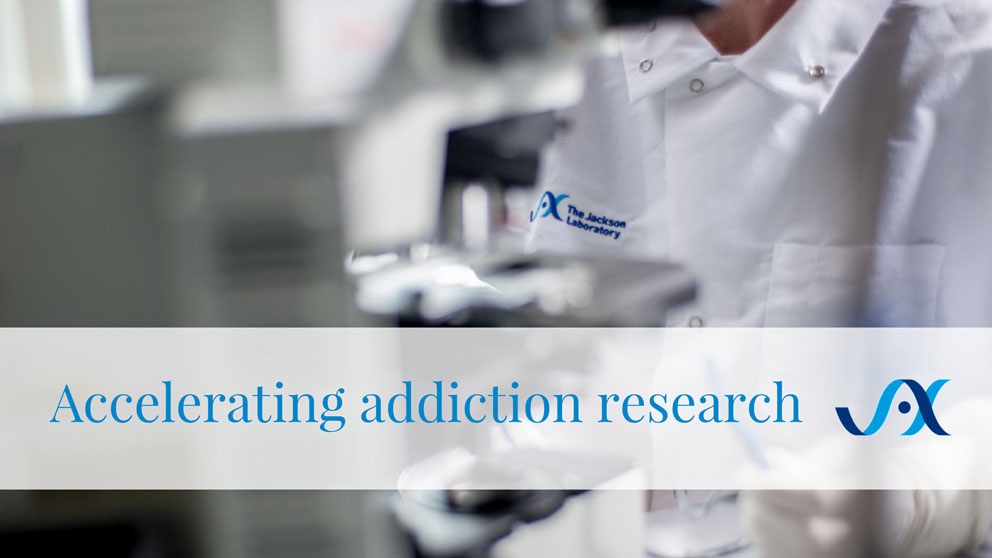
New funding and partnerships are helping JAX’s Molly Bogue accelerate progress in addiction research.
The burden of addiction worldwide continues to grow. The World Health Organization estimates that 5.4 percent of the global burden of disease is related to drug and alcohol issues. And in America, deaths from opioid addiction have reached epidemic levels.
Through the power of genomics, JAX is working to identify the genes associated with addiction, with the goal of changing the paradigm of addiction therapy.
Scientists can use this knowledge not only to discover better treatments for people battling addiction, but to identify and protect individuals who are prone to addiction, providing the potential to develop new preventative measures.
Unfortunately, many of the genes affecting these complex traits remain unidentified, and research into causes of and treatments for addiction hasn’t been progressing as quickly as possible.
A “reproducibility crisis” has been plaguing preclinical research for years. If results from a particular study or laboratory are correct and reliable, other labs should hypothetically be able to perform the same experiments and get the same results. Unfortunately, failed attempts to reproduce prior results have been calling more and more studies into question.
Behavioral scientists, including those addressing addictive behaviors and vulnerabilities, have been particularly vocal in their efforts to shine a spotlight on the lack of replicability. But recognition of the problem hasn’t yet led to practical, cost-effective solutions.
Molly Bogue, Ph.D., a research scientist in the laboratory of JAX Associate Professor Elissa Chesler, Ph.D., aims to improve the situation. She is helping make sure that future addiction studies can serve as a more reliable foundation for clinical practice.
Bogue works on the Mouse Phenome Project, measuring addictive behaviors in different strains of mice and pairing that data with genetic information, all of which is stored in the Mouse Phenome Database (MPD). MPD will also store data for the U.S. Center for Systems Neurogenetics of Addiction, supported by the National Institute on Drug Abuse (NIDA).
Bogue recently received a $759,347 grant from NIDA to support a project specifically aimed at conquering the reproducibility crisis.
In mouse studies, particular strains of mice are affected differently by small environmental factors unique to a particular laboratory. This interaction between genetics and lab environment is called “noise,” and it has been reported as a potential source of irreproducibility in many studies, including several important behavioral studies.
“Our approach uses the interaction noise to generate an adjusted ‘yardstick’ against which genotype differences are judged, raising the benchmark for declaring a genotype effect significant and trading some statistical power for ensuring replicability,” says Bogue.
To generate this “yardstick,” Bogue is partnering with Yoav Benjamini, Ph.D., a professor of applied statistics at Tel Aviv University. The two want to develop methods for researchers to evaluate the replicability of their results before those results are published.
“Dr. Benjamini is a world-renowned statistician who has contributed greatly to many fields of biomedically relevant science,” says Bogue. “His knowledge and expertise are vital to our project.”
The binational collaboration will enhance widely-used data resources developed at JAX to make methodological innovations from Dr. Benjamini and his team available globally.
Once the team has developed their approach, they intend to test it by analyzing data from multi-lab replications of behavioral genetics experiments, including many addiction studies happening at NIDA Centers of Excellence across the country.
Bogue and Benjamini believe that giving researchers these statistical tools will significantly reduce the number of irreproducible papers. If a higher percentage of published results are reliable, preclinical research as a whole will be able to progress more quickly toward treatments for addiction and other disorders.
“We hope our work will help increase the public health impact of NIDA research and ultimately restore confidence in the public’s investment in research,” says Bogue.